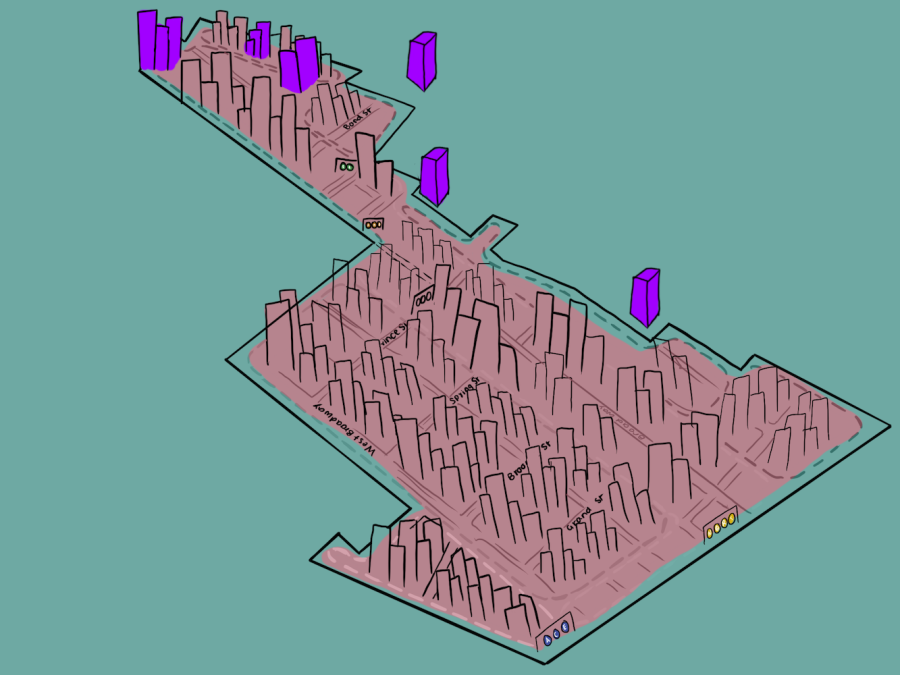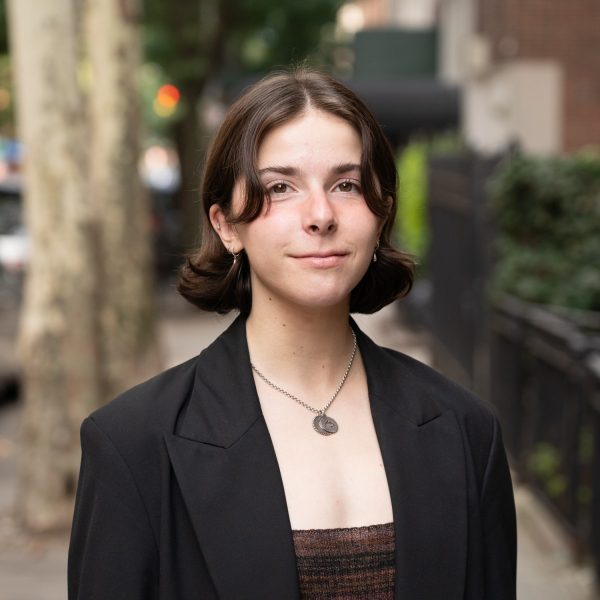Village advocates side with city, challenge NYU rezoning lawsuit
In a motion, many neighborhood organizations supported a provision banning university uses in rezoned parts of SoHo and NoHo and asked the court to order an environmental review of NYU expansion plans in the area if the university is successful in court.
A map illustration of the NoHo and SoHo neighborhoods in New York City. (Illustration by Aaliya Luthra)
January 27, 2023
A consortium of Greenwich Village neighborhood advocacy organizations have filed a motion to intervene in a lawsuit that was previously filed by NYU against New York City. The original lawsuit was over a provision in the 2021 rezoning of Manhattan’s SoHo and NoHo neighborhoods that prohibits certain university uses in the area. NYU claims this provision is unconstitutional.
The group that created the motion — including the Coalition for Fairness in SoHo and NoHo, Village Preservation, the NoHo Neighborhood Association and the Bowery Alliance of Neighbors — filed it to request that the court order an environmental review of planned university projects in the area if NYU wins the lawsuit.
NYU owns or leases a total of seven properties in the rezoned area, which is located east and south of NYU’s Washington Square campus, according to NYU’s lawsuit. NYU spokesperson John Beckman said that the rezoning provision the university is suing over is in violation of the Cornell Doctrine, a legal precedent in New York state law that prohibits residential areas from excluding educational uses.
“Regardless of this latest development, NYU remains confident of the soundness of the central argument at the core of its case,” Beckman said. “The university expects to prevail in the courts.”
Beckman has previously said NYU is not planning to put new dorms or classrooms in rezoned SoHo and NoHo.
On Sept. 23 of last year, New York City lawyers moved to dismiss the lawsuit, arguing that NYU did not offer a cause of action for filing it. The university filed a motion to oppose the dismissal on Dec. 12. Two days later, the Commission on Independent Colleges and Universities — which includes NYU, the New School and Pace University — filed an amicus brief, information submitted to the court by parties not directly involved in a case, in support of NYU’s lawsuit.
Most recently, on Jan. 13, the court extended the deadline for the city’s lawyers to file a motion to dismiss from Jan. 20 to March 31. The decision to extend was made in light of the original motion to dismiss, NYU’s motion against the dismissal and the amicus brief.
Christopher Marte, a councilmember whose district includes much of the rezoned area, said the motion aims to increase access to affordable housing as well as demonstrate that NYU’s impact in SoHo and NoHo needs further review.
“NYU has already taken over Greenwich Village through its recent expansion, and now they’re suing to add two more neighborhoods to their real estate portfolio,” Marte said. “Allowing NYU to build in SoHo and NoHo will only confirm that any opportunity for affordable housing will be squandered by dormitories, fraternities and big business.”
Many of the organizations that filed the motion have criticized the rezoning, saying that it may favor the construction of luxury residence and retail spaces over affordable housing units.
The SoHo Alliance, a community organization not included in the motion, sued the city over the plan in May 2021, but was unsuccessful in court.The Coalition for Fairness in SoHo and NoHo also filed a lawsuit in February of last year to prevent the rezoning plan from being implemented.
The coalition also criticized parts of the rezoning agreement that require residents of Joint/Live Work Quarters for Artists — also called JLWQA units — to either be registered as artists with the city or pay a $100 per square foot conversion fee to turn JLWQA units into regular residential units. These units make up 32% of the housing spaces within the rezoned area, and the artist certification residency requirement has long gone unenforced.
Andrew Berman, the executive director of Village Preservation, said NYU expansion into the rezoned area would make the creation of affordable housing more difficult and negatively affect arts uses in the area.
“That the university thinks that zoning rules which limit who can build where don’t apply to them is the height of arrogance but, sadly, par for the course,” Berman said. “Should NYU prevail, it will not only be bad for SoHo and NoHo, but bad for New York City.”
Contact Carmo Moniz at [email protected].

























































































































































